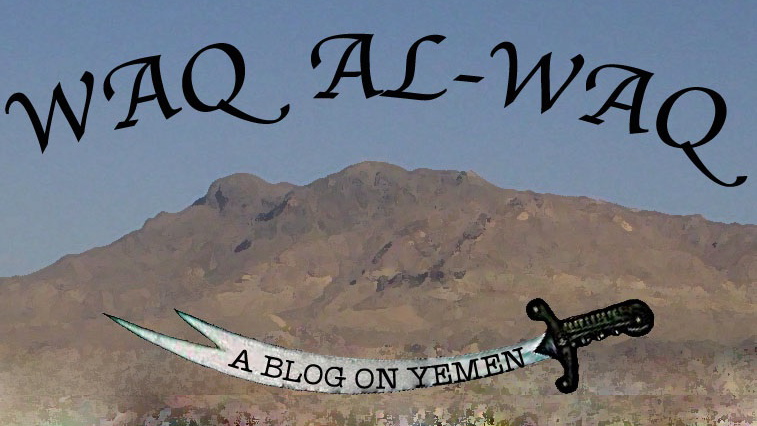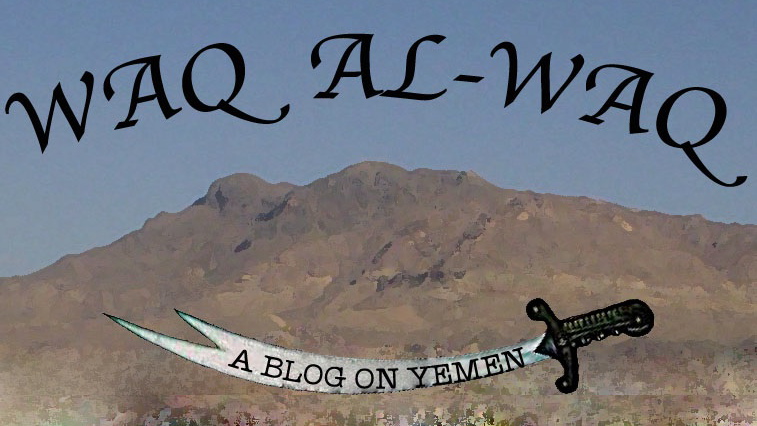On that Wall Street Journal article
Greg mentioned this below, and promised not to be snarky about it, which is admirable, but in the end unsustainable. Not when there is an editorial such as this, which puts into pretty stark relief the contrast between the Journal’s excellent reporting and the sheer mendacity of its editorializing. Take for example the first paragraph.
In recent months, Osama bin Laden’s ancestral homeland of Yemen has come into its own as al Qaeda’s safe haven on the Arabian peninsula. Now a U.S. court and the Obama Administration may send a batch of potential terrorists there.
I mean, that’s perfect, right? Barely a clause in you have the single most misleading cliche in all of Yemencentric writing. Also, for those of you who enjoy domestic politics, you have the implication of liberal judicial activism combined with the idea that Obama is willingly letting potential terrorists go free. This is a perfect storm of bullshit.
Greg also mentioned the “triangle of evil”, but left out the beginning of that phrase, which reads in full “a so-called triangle of evil”. This is a neat trick. Even though the author of this article is the only person ever to call it that, saying “so-called” makes it seem like he didn’t just make it up. It’s a good one to use. “Brian O’Neill, the so-called handsomest man on the planet, is blogging today.” See? It lends an attractive veneer of authority to garbage.
OK, a little more substance at this point, but first a caveat. I know this just kind of seems like normal internet fisking, but one of the points of this blog is to counteract the reams of misinformation about Yemen. And this isn’t what we’ve done before- shout “this person just doesn’t know anything about Yemen!” while our monocles pop out in indignation- but an attempt to disprove purposefuly misleading information. I don’t mean to speak for Greg, but I would guess one of our hopes is that someone might have their interest (or anger) piqued by the Journal piece and then do some searching and come across this. And if that sounds arrogant, well…it is. Believe me, we’re even more insufferable in person. Let’s move on.
The root of the problem is the government’s tacit non-aggression pact with al Qaeda. Yemeni President Ali Abdullah Saleh tells American officials he can’t push too hard, and for too long the U.S. has indulged him. The Saudis used to play this same double game. Then al Qaeda attacks killed some 200 people and jolted them into a crackdown. The Kingdom has been free of terrorist violence for the past three years.
Basically, beside the plagarism of the “tacit non-aggression pact” (a line which I believe Greg has a patent on), the implication is that Salih has been lying when he says he can’t push too hard. This is: wrong. Yes, Salih plays all sides, in an effort to both keep the country together and to keep himself in power. But the fear of pushing too hard is a true one. Even if most people dislike al-Qaeda, the ancient distrust of central power is a powerful force in Yemeni culture. This isn’t a double-game as much as it is a fact of life.
Eleven former Saudi Gitmo inmates who went through rehab are back on the government’s most wanted terrorist list. Said Ali al-Shihri turned up in a January video as al Qaeda’s No. 2 man on the Arabian peninsula based in Yemen. If some of the Yemenis rejoined the global jihad — and the odds suggest they would — all that alleged “global good will” won for closing Gitmo will have come at far too high a price.
The beginning of this is true, of course. They actually have some facts. But it is the end of it that is maddening. It is an assertion, not an argument. There is no discussion of the balance between keeping Guantanamo open and releasing dangerous people. There is, however, a sneering at the “alleged” benefits of closing Guantanamo, even though that is not is dispute by any reasonable people.
This is an incredibly complicated issue, one about which the President rightfully said “this is the toughest issue we will face”. No one is suggesting that we will just let all the prisoners go back to Yemen willy-nilly, with some money in their pocket and our sincere apology. That’s as absurd as Congressman pretending that these dudes are too dangerous to be locked up in Supermax prisons. But it is article like these, filled with misdirection, overheated rhetoric, slippery connections and blatant fear-mongering that make it even more difficult. I don’t know if the authors of this editorial believe what they are saying, or if they are only trying to make trouble for the Obama administration. I don’t know which is worse. We need sober heads and actual knowledge if we are going to avoid further mucking up a horrific status quo.




